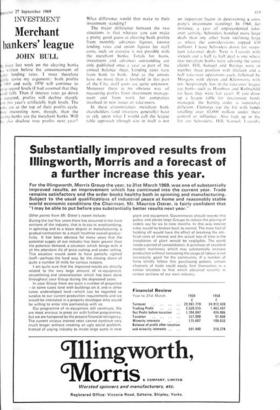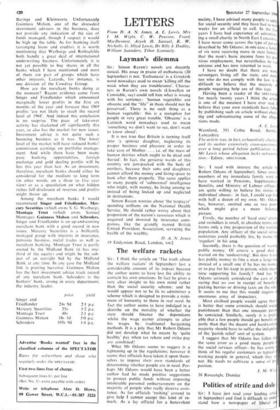INVESTMENT
Merchant bankers' league
JOHN BULL
ly piece last week on the clearing banks as written before the announcement of 2her lending rates. I must therefore iehtly revise my argument: bank profits 1969 and early 1970 will continue to at record levels (I had assumed that they ould fall). Then if interest rates go down expected, profits will decline sharply am this year's artificially high levels. The inks are at the top of their profits cycle. lore interesting now, though, than the aring banks are the merchant banks. Will iee also disclose true profits next year?
What difference would that make to their investment standing?
The major difference between the two situations is that whereas you can make a pretty good guess at clearing bank profits from monthly advances figures, known lending rates and union figures for staff costs, such an exercise is not possible with the merchant banks. Totals for loans, investment and advances outstanding are only published once a year as part of the annual balance sheet, Lending rates vary from bank to bank. And as the unions have no more than a foothold in this part of the City, staff costs are quite unknown. Moreover there is no obvious way of measuring profits from investment manage- ment and from work for companies involved in new issues or take-overs.
In these circumstances merchant bank shareholders (and investors generally) have to rely upon what I would call the league table approach (though size in itself is not
an important factor in determining a com- pany's investment standing). In 1968, for instance, a year of unprecedented take- over activity, Schroders handled more large deals than any other bank (defining large as where the considerations topped £10 million). I have Schroders down for seven- teen take-over deals. Next is Lazards with sixteen and a half (a half deal is one where two merchant banks were advising the same client). Hill, Samuel and Barings were in number three position with thirteen and a half take-over operations each, followed by Morgans with eleven and Kleinworts with ten. Surprisingly low in the take-over league are banks such as Hambros and Rothschild (at least they were last year). If you draw up a league table for investment funds managed, the batting order is somewhat different. Flemings top the list with funds totalling over £1,000 million under their control or influence. Also high up in the list are Schroders: Hill, Samuel: Lizards;
Barings and Kleinworts. Unfortunately Guinness Mahon, one of the shrewdest investment advisers in the business, does not provide any indication of the size of funds managed, though I suspect it would be high up the table. As for banking itself (arranging loans and credits), it is worth mentioning that Warburgs and Rothschilds both handle a great deal of international underwriting business. Unfortunately it is not yet possible to buy shares in all the banks which I have mentioned and most of them are part of groups which have other interests. Lazards, for instance, is one division of the Cowdray Group.
How are the merchant banks doing at the moment? Recent evidence came from Singer and Friedlander which announced marginally lower profits in the first six months of the year and forecast that 1969 profits `are not likely to reach the record level of 1968'. And indeed this conclusion is no surprise. The pace of take-over activity has slackened off significantly this year, so also has the market for new issues. Investment advice is not quite such a booming business as it was. The lower level of the market will have reduced banks' commission earnings on portfolio manage- ment. And while there have been many pure banking opportunities, foreign exchange and gold dealing profits will be less this year than last. As an investment, therefore, merchant banks should either be considered for the medium to long term (in other words, on a three to five year view) or as a speculation on what hidden riches full disclosure of reserves and profits might throw up.
Among the merchant banks I would recommend Singer and Friedlander, Mer- cury Securities (which owns S. G. Warburg), Montagu Trust (which owns Samuel Montagu), Guinness Mahon and Schroders. Singer and Friedlander is an up-and-coming merchant bank with a good record in new issues. Mercury Securities is a brilliantly managed group with interests in insurance, pensions business, metal trades as well as merchant banking. Montagu Trust is partly owned by the Midland Bank (it has one- third of the equity) and might be the sub- ject of an outright bid by the Midland Bank at any time. In any case the Midland link is proving lucrative. Guinness Mahon has the best investment advice track record of any merchant bank. Schroders is the bankers' bank, strong in every department, the industry leader.
price yield
Singer and Friedlander 24s 9d 2.1 p.c.
Mercury Securities 35s 1-2 p.c.
Montagu Trust 48s 2•l p.c.
Guinness Mahon 18s 3d 3.0 p.c.
Schroders 103s 9d 1.4 p.c.







































 Previous page
Previous page